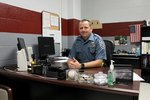 Severna Park
Severna ParkFair, 65°
Wind: 19.6 mph, S
 Severna Park
Severna Park

After having his back broken twice by drunk drivers while working patrol, Corporal Alex Swartz feels at home in Severna Park High School. The school resource officer (SRO) still combats the unknown — fights in the cafeteria, students vaping in class — but in this environment, he can see his impact.
“Being a police officer is usually a thankless job,” Swartz said. “You might take someone to the hospital and save their life, but you don’t know who they are and you don’t see what happens after. There’s no light at the end of the tunnel. With this job, you get to experience the difference you make.”
For Swartz, and his former colleague and current Broadneck High SRO Corporal Cory Eslick, that difference-making comes in many forms.
“I deal with fights. I deal with domestic situations between boyfriends and girlfriends, or mom doesn’t want dad to get the kids,” Eslick said. “We handle all of it.”
The School Resource Unit was started in 2007, although some officers predate that unit. The Anne Arundel County Police Department currently deploys 29 SROs to schools, one for every high school and all but two middle schools, and also staffs two sergeants and a lieutenant.
Eslick joined Broadneck about eight years ago after getting his start with the National Security Agency, spending two years in Baltimore City and then working patrol in Anne Arundel County’s Western District, where he met Swartz.
After twice having his back broken, along with his neck and leg one time each, Swartz was medically cleared to take a position at George Fox Middle School in Pasadena during 2011. The following summer, he came to Severna Park High, the school from which he graduated in 1989.
Both officers said their main goal is to form relationships with students, serving as a resource first and an officer last.
“If you don’t develop relationships, you’re just an adult who delivers punishment,” Eslick said.
Swartz added, “Some students might have seen something happen to their parents or their siblings and they don’t like police. That’s OK. I don’t dislike them for it. I want to hear what happened and understand where they’re coming from.”
By walking the hallways during class changes, by fielding tips from students and parents, and by attending high school football games, the SROs build a rapport with youth so they know what’s going on around the school, whether it’s a depressed student or drug use.
“I hear from kids about it being in classrooms,” Swartz said of Juuls and vaping products. “They’ll sneak puffs from their Juuls in class now. I don’t blame the teachers, because they have to turn and write on the chalkboard at some point. They can’t watch every second. And I don’t blame the parents. … The kids think it’s OK because it’s just vape. They don’t understand there are chemicals in it. And it’s easier for them to hide it because with THC oils, you don’t have the smell of a joint or the burning tobacco smell.”
When it comes to those instances, Eslick said SROs don’t have the legal ability to issue citations but the school administration can seize the products and issue punishment.
Drugs aren’t the only safety concern in Anne Arundel County.
“As police, we are constantly thinking, ‘What’s the worst thing that can happen?’” Eslick said. “The school does lockdown drills, fire drills, earthquake and hurricane drills, and we work with administration to bring all our expertise to the table.”
While much of their work can be labeled as intervention, both officers work to prevent trouble by spreading positive messages. Swartz runs a “Falcon Pride” Facebook page and posts photos to recognize students and also blurbs to congratulate sports teams in victory but also in defeat when the athletes show good sportsmanship.
Eslick has installed positive signs around the Broadneck campus. “I want them to see words of affirmation,” he said. “Everything on social media, everything on the news is negative. I think that’s starting to tear at our students. If you look at the nation, suicide is up. Depression is up.”
Those actions may affect just one student or several, but each kid matters, the officers emphasized. Swartz has been contacted by several former students who have gone through the police academy and one who is trying to get his GED after dropping out of high school due to a bad home situation. He even had a one-year sobriety party and invited Eslick and Swartz to attend.
“First and foremost, we want to be a resource to a kid, to a parent or a counselor,” Eslick said. “Officer is the last thing we want to do. Our group of officers is not focused on arrests and stats. What matters is us making a difference in students’ lives and how safe our school is.”
Comments
No comments on this item Please log in to comment by clicking here